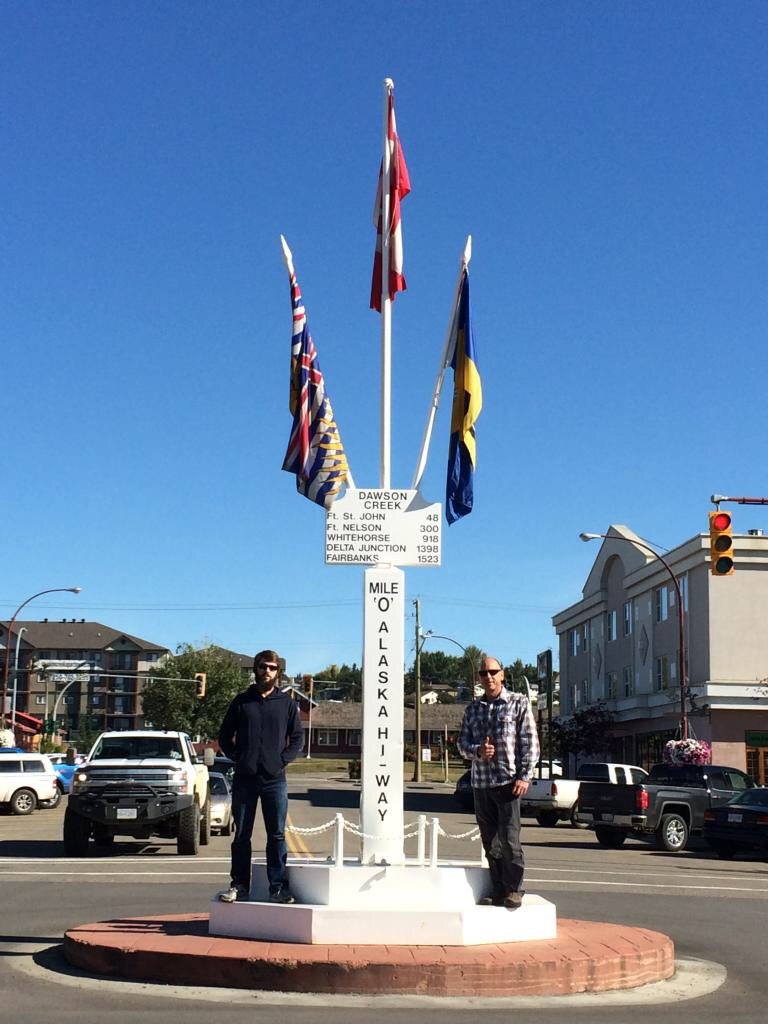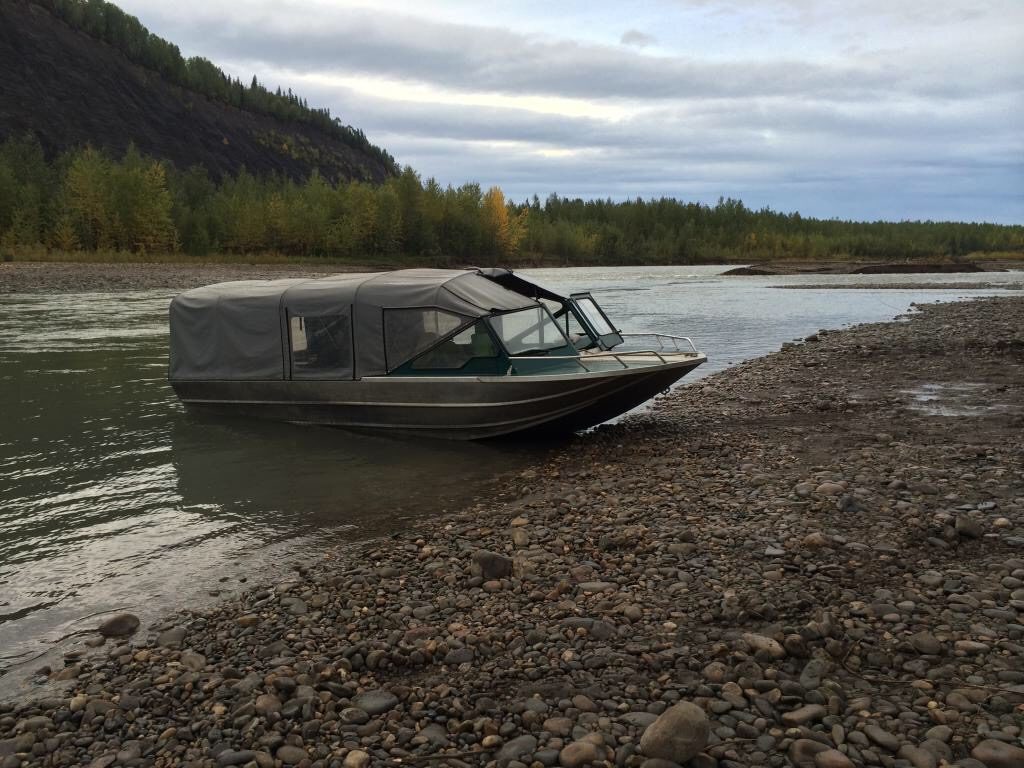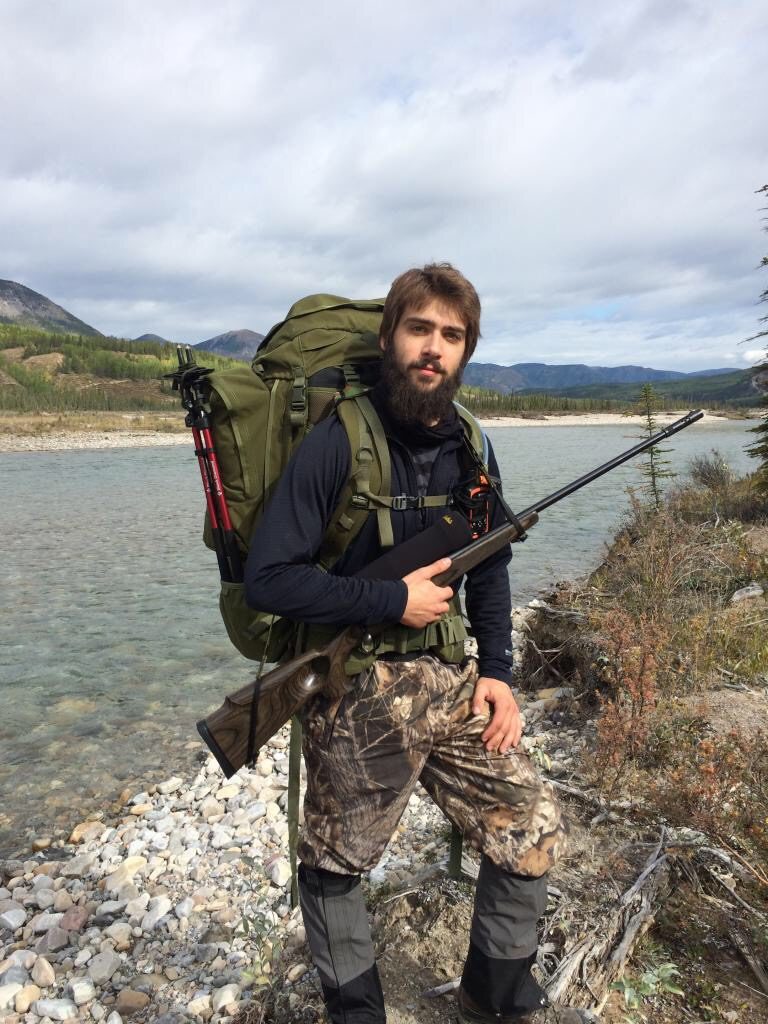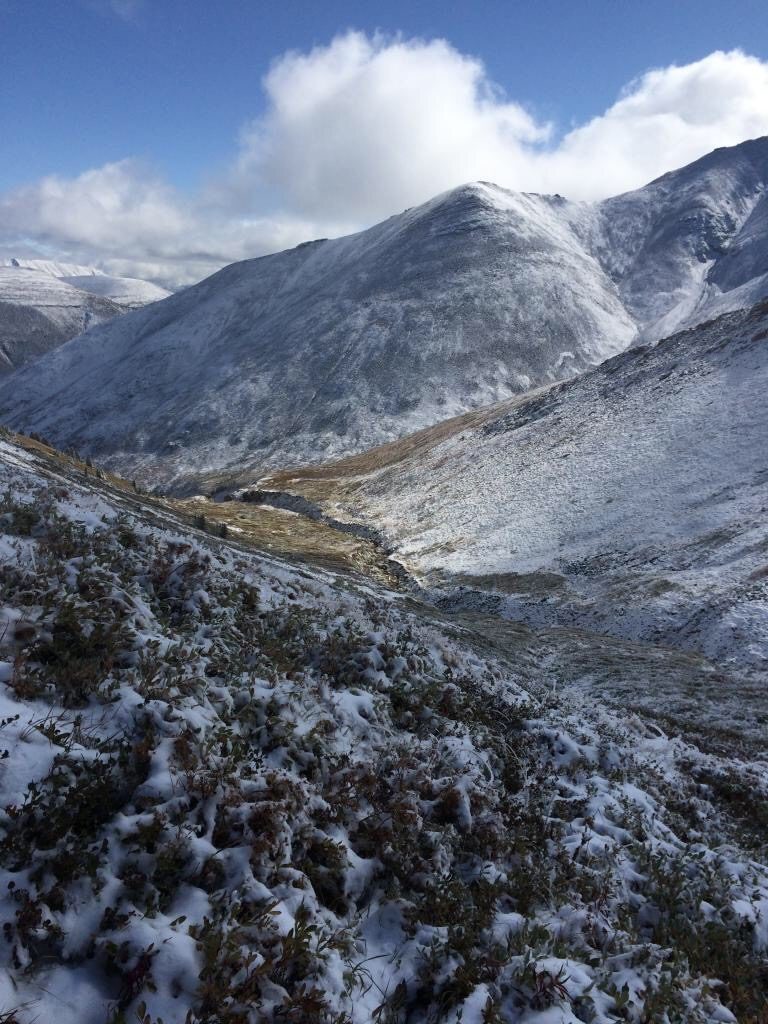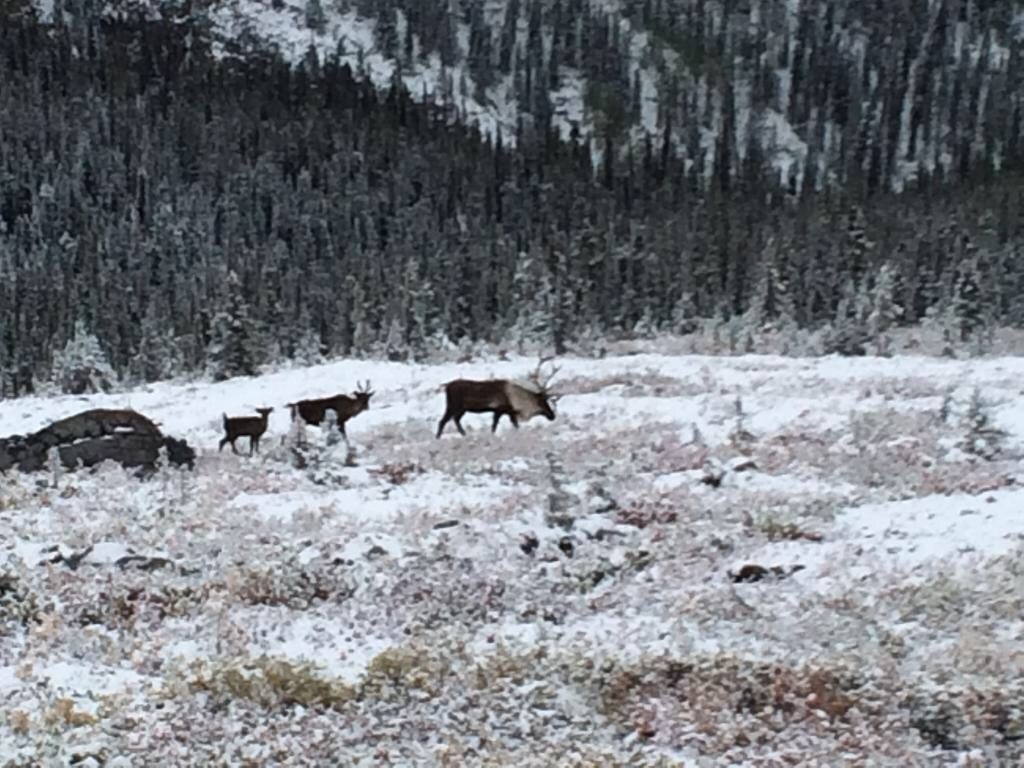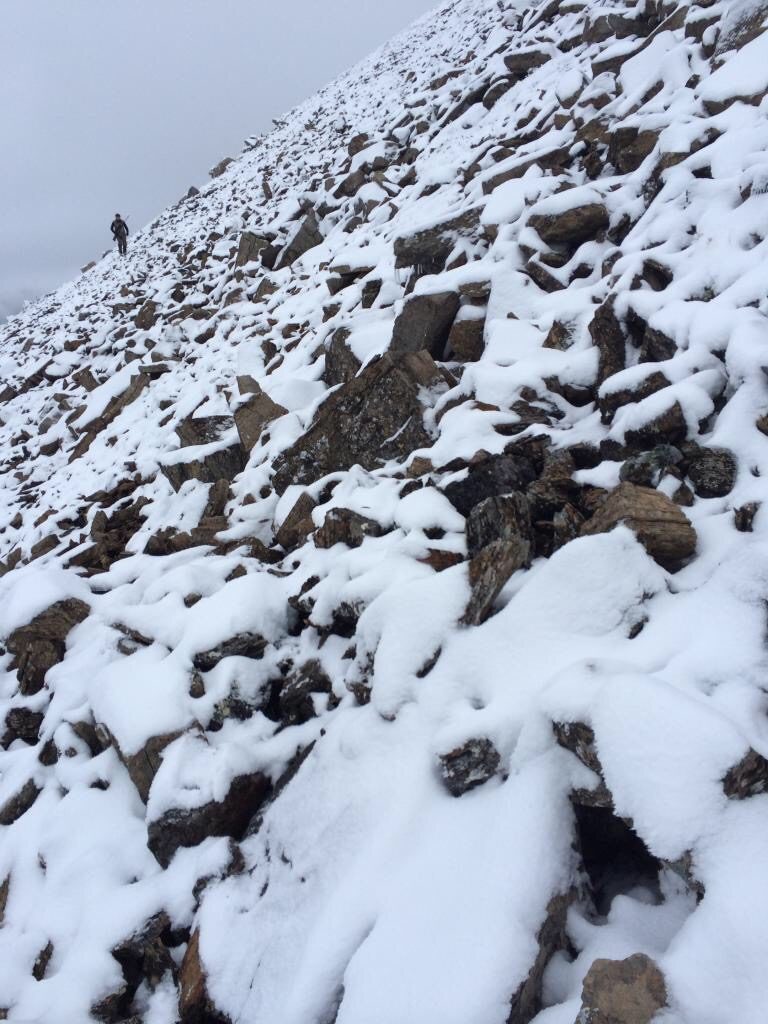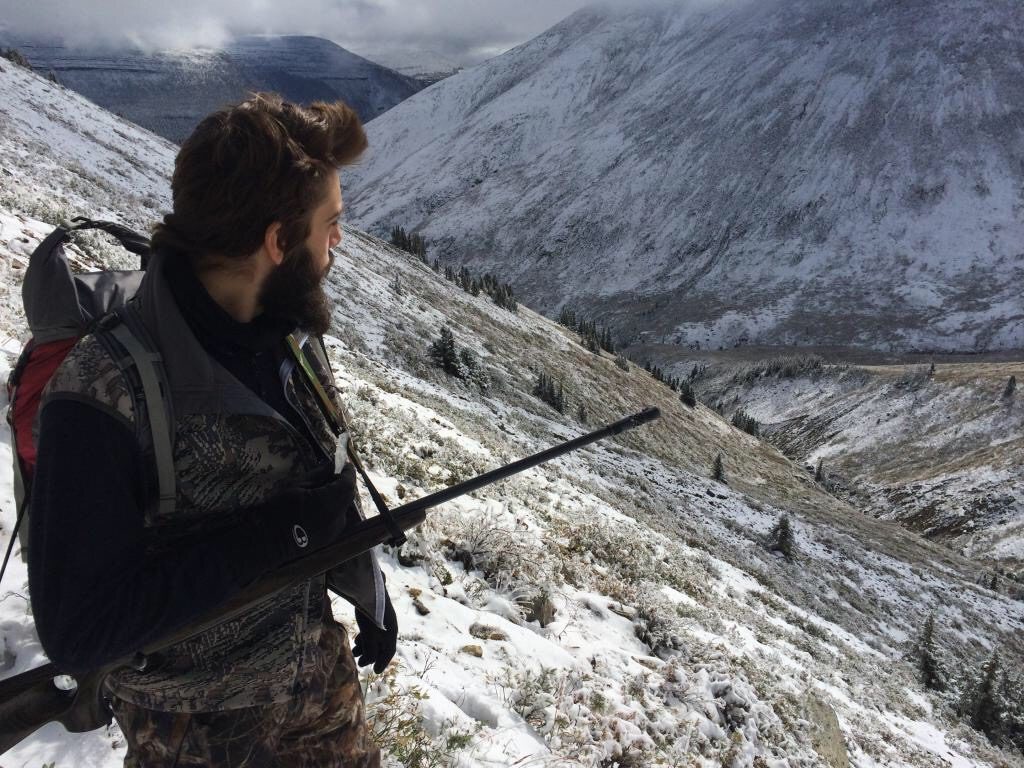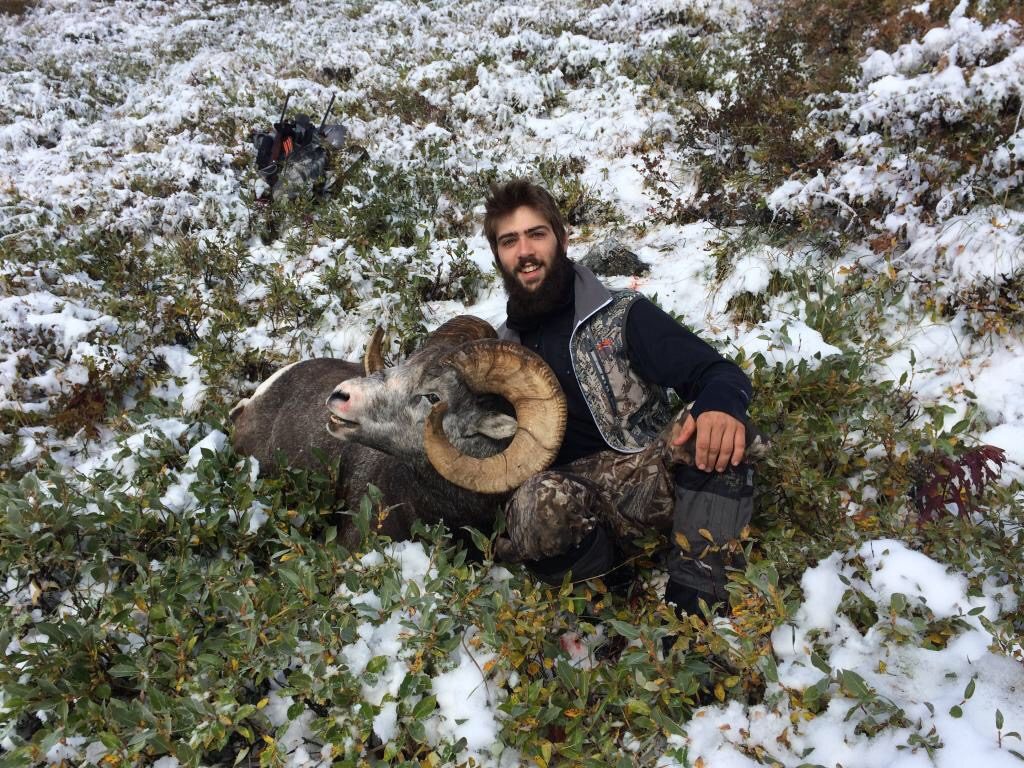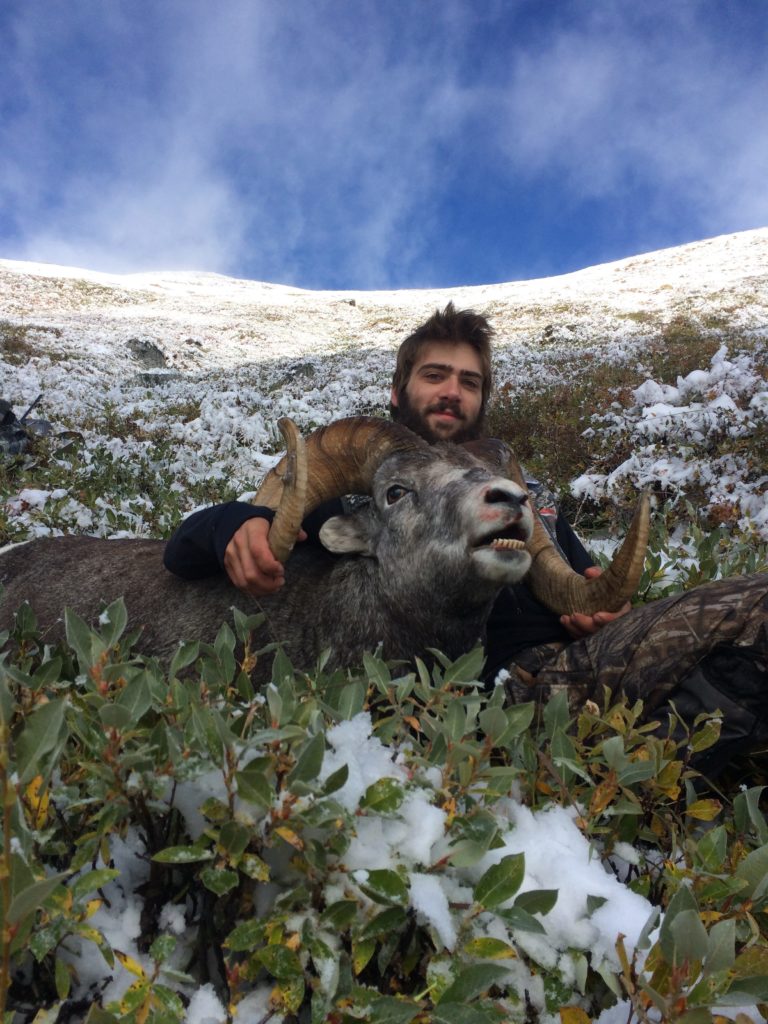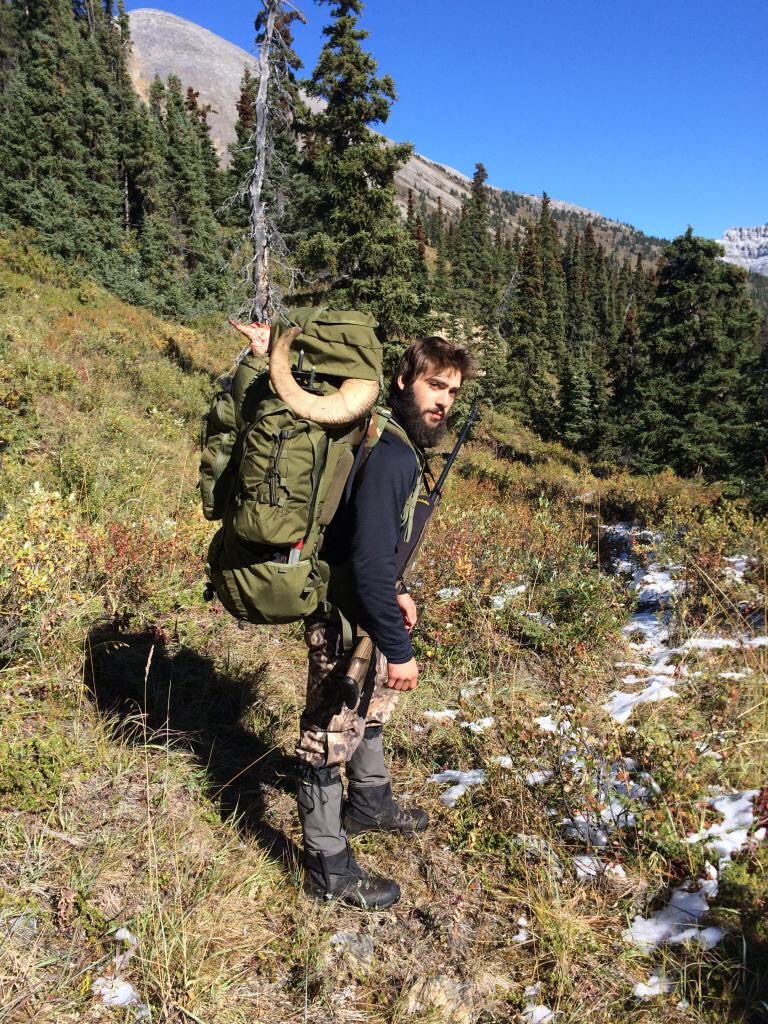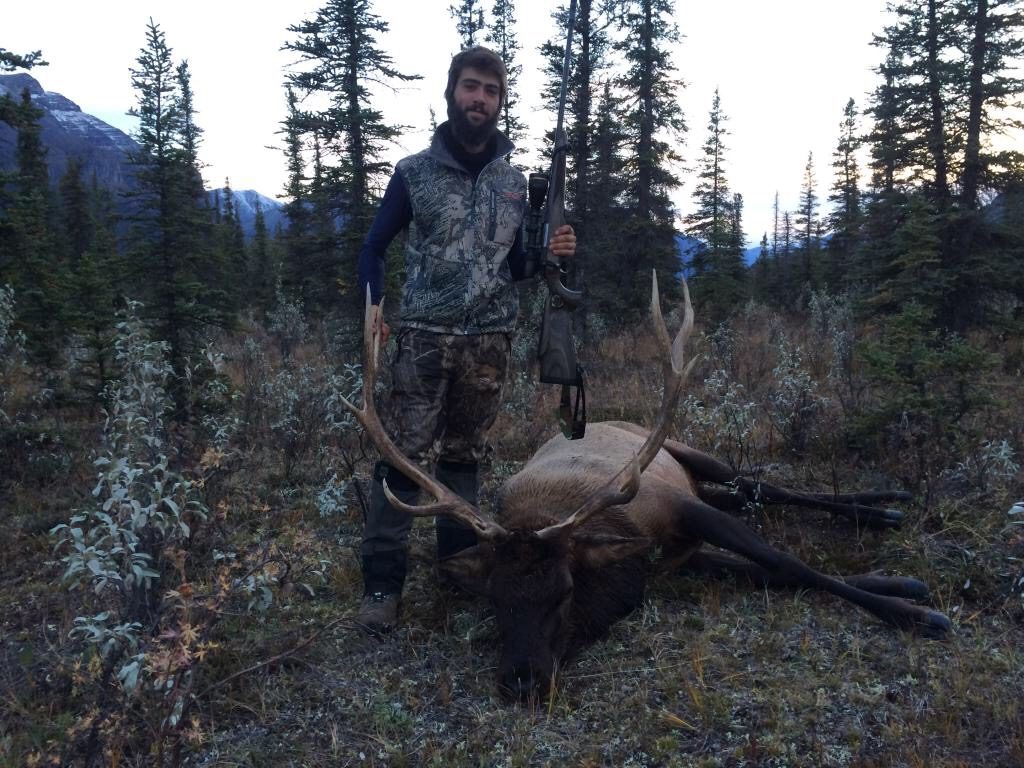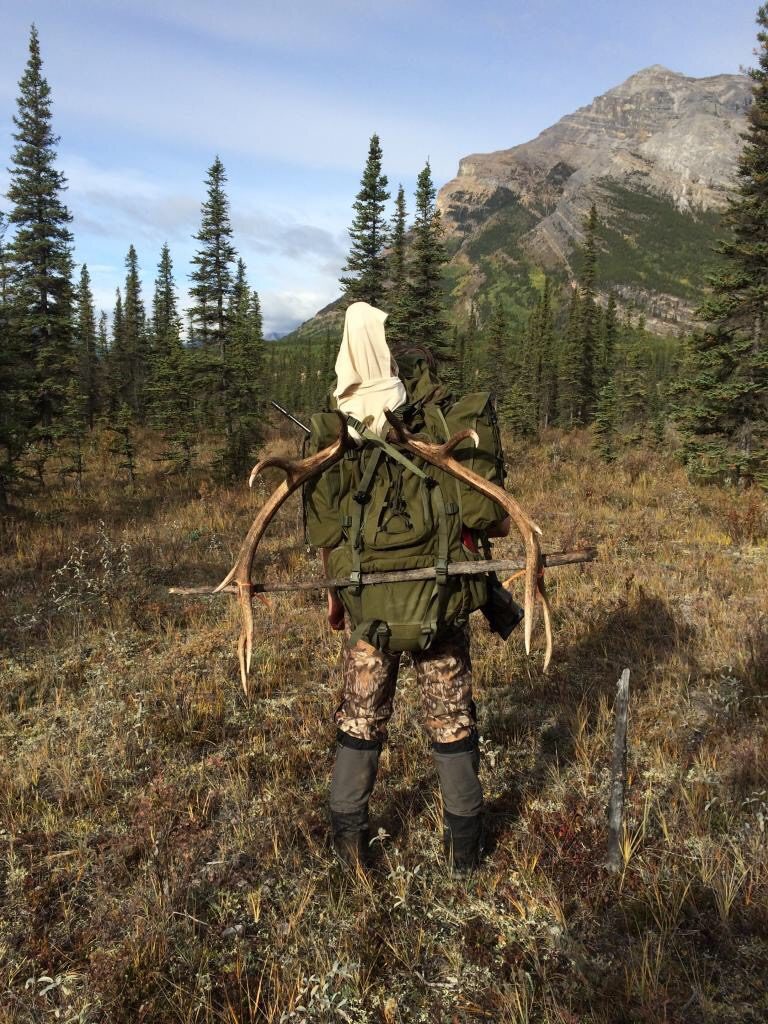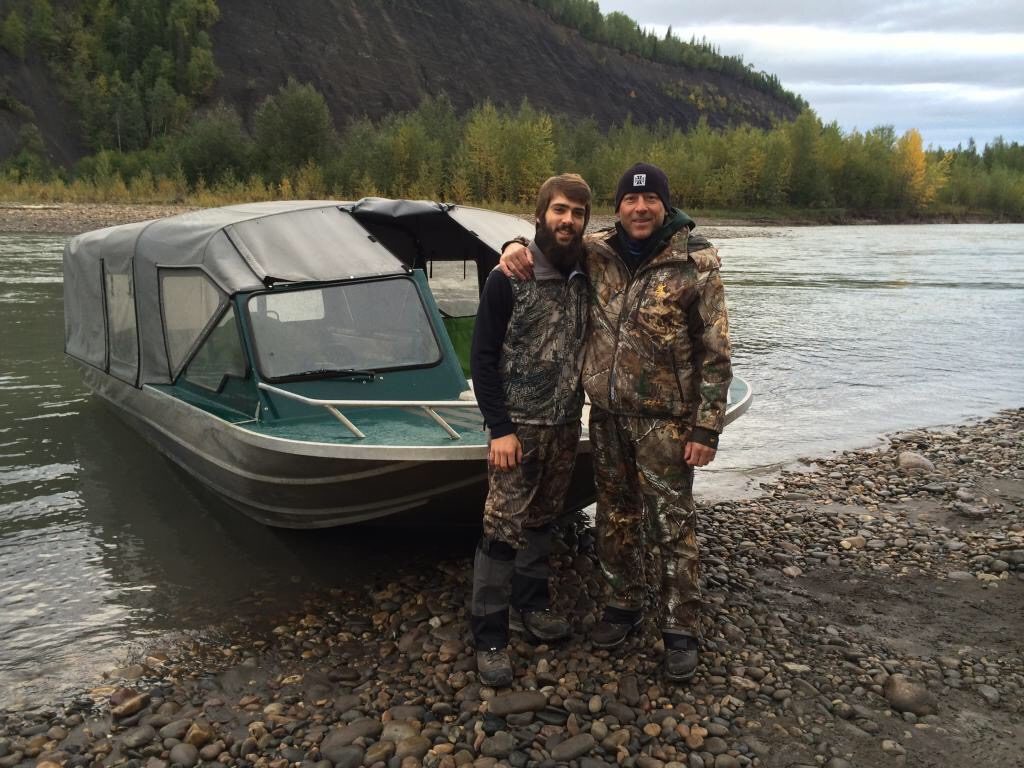My dad and I started driving north, from Vancouver to Fort Nelson, on September 1, 2014, for the first of many great northern hunts. My dad has been coming to this part of our home province of British Columbia since long before I was born, but this would be my first time traveling this far. Heading to the big country of the Tuchodi River, our quarry was to be Stone sheep and elk. We had been preparing for this trip for months now; packing, repacking, and repacking again. And of course, no big hunting trip is complete without an epic beard, which I’d been growing for a full year. We took our time driving, effectively being tourists in our own province, stopping at a few notable sporting goods shops to look around, a picture with the “Mile 0” marker of the Alaska Highway, and a quick visit to an old friend of my Dad’s along the way. When the big day finally arrived, we met Kevin of River Jet Adventures at the Muskwa River boat launch bright and early. We loaded our gear and set off for an unforgettable adventure.
After a harrowing boat ride, we arrived at the drop-off point an hour ahead of schedule; packing light certainly has its advantages. I never thought a river boat ride would be as exhilarating as this, and the thought of the ride out only added to the excitement! It was like a roller coaster, if that coaster lasted for four hours. We unloaded the boat and wasted no time in shouldering our packs and making our way up the mountain. We hiked as far as we could for a few hours, zigzagging across the creek before the relatively flat hike turned into a steep, mountainous grind.
That first day we hiked ten kilometres away from the Tuchodi and set up a quick camp in the wind-fallen mountainside as the night began setting in. The next day took us to our chosen spike camp location, only two and a half kilometres from where we had just spent the night. From the base of the river we had gained around seven hundred meters of elevation, with steep gullies and wind-felled trees hindering our progress. We set up our spike camp and began hiking up the valley to glass and get a bearing of the basin we had planned our hunt in.
In the first couple of hours, we saw a mule deer, a small herd of five caribou, and several elk, but our focus up here was entirely set on Stone sheep. The scenery was utterly breathtaking; like nothing I could ever have imagined. Pictures will tell a thousand words, but do no justice in portraying the true beauty that a landscape can behold. It’s like a drug for your eyes; when you crest over the hill and instantly, almost involuntarily, drop your jaw to say, “Wow.” We glassed until the light faded away, forcing us to head back to camp.
Our next task was to find a source of water, which was easier said than done. The main creek bed was bone dry, while the only small spring we found was covered in animal sign. Sheep, elk, caribou, bears, and deer had all had trampled and defecated around this spring. It was clear from the scene that this was one of the only sources of water around, and it was well used. We excavated the ground back to make a cleaner area to work with and dug a small hole for the water to pour into. The tubes on our hydration bladders came in handy for sucking the water from the pool and dropping it into our various containers. We took all we could fill and hauled it back to camp so it could be boiled and put to use.
The next morning greeted us with four inches of fresh snow and heavy, hanging fog. The snow was a life saver; we were able to melt it down to use as our water source. Over the course of the next three days, we would see the same groups of elk and caribou but in many different spots. The caribou were not shy and often came within fifty yards of us on the slope above camp. The elk were at the far end of the basin when we first saw them, and by the end of our spike out they had made their way out around the corner. The bull was starting to rut, and as the small herd ventured across the opposite hill from where we were glassing, we quickly had him bugling back to our calls. That was the first time I’d heard an elk bugle outside of a video. It was incredible to say the least! We couldn’t see him through the thick fog between us, but we could hear him clear as ever, making the hair on my neck stand on end.
At the end of the third day, we finally spotted sheep in the fading light — a band of three rams, but none were legal. It was getting too dark to see them clearly, so we retreated for the day. The next morning we hiked right to the spot we had seen them, found where they bedded for the night, and saw that there was a fourth ram with them. It wasn’t long until we spotted them down at the bottom of a dry creek bed below us, doing what sheep do. We watched them mill around for a few hours, eating and butting heads; what a sound! Like a gunshot echoing through the mountains.
I took my pack off to grab my video camera so I could capture the display they were putting on for us, and one of them must have seen me move. In an instant one took off running, then another, followed quickly by the last two, running up the mountain in a straight vertical line, over boulders and through steep shale like it wasn’t even there, before disappearing over the skyline. They went up the mountain faster than we could have run down, making it clear that when you’re in the sheep’s house, they always have the advantage.
After they disappeared we decided to venture around the corner to a vein of the basin where we had not yet been. Dad was 30 yards ahead and below me, when suddenly I saw him freeze mid-step, motioning for me to do the same. He turned around after a few seconds and put his hands up to his head, making a curling motion on either side. He whispered the magic words, “Big ram!” I pulled up my binoculars, spotting three rams feeding in the small gullies of scree. It was pretty easy to identify the big boy of the group. His horns went wide, away from his face, swooping up past the bridge of his nose. His body was large, round and solid, an absolute bruiser. He was big, and he was legal.
We had to get into a better position for the shot, so as they put their heads down we began moving forward, freezing when they looked up, getting closer with every passing minute. It was early afternoon, and we had all the time in the world to do this right. The wind was in our face, and they didn’t seem bothered by our presence. I don’t think they even knew we were there! I finally found a good spot and rested the rifle on my pack, while Dad ranged the biggest one at 240 yards out. I could just see the top of his back, giving me only a spine shot, but I didn’t want to take that risk and possibly send my shot high. There were scree, bushes, and rocks covering up any chance of a lung shot, but the direction the sheep were feeding would take them to the top of a gully, directly into my shooting lane, where his vitals would be exposed.
I waited a good 20 minutes for him to move up into position, laying prone in the snow, with little more than a shirt and a light vest. The weather had turned warm and sunny, and my jacket was stuffed into my pack. I started shivering around minute 15, which seemed like an eternity to watch a ram through a rifle scope. Finally, he moved far enough to expose his vitals, and I was ready. I squeezed the trigger.
At the bark of the rifle, the other two rams took off running, the bullet from my 7mm Remington Magnum hit its mark, and the ram staggered. He took two steps forward, tried to steady himself, tipped over, and disappeared from view. I was in shock. I stared, bewildered, at the spot where the ram had stood, replaying the moment in my head. Was this real? Did I really just shoot my first Stone sheep?!
Incomprehension gave way to happiness, hugs, and congratulations. We had no idea how big he actually was until we found him on the hillside. This ram was ready for a cold winter, and it was clear that this was going to be a heavy pack out. He was dark in colour, rock solid, and old. Truly a monarch of the mountains. We snapped a few pictures and got to work skinning and deboning the meat. We took the skull and cape back to camp, and spent the rest of the day de-fleshing, cleaning the skull, turning ears, and splitting lips.
The next morning we went back for the meat, which had frozen in the snow. We packed up our gear and started the hike back to base camp. We got down to the bottom of the mountain two hours before sunset, with just enough time left in the day to set up camp, have dinner, and begin recovering. The next day was eight-and-a-half hours of hiking, river crossings, and very little rest. Grueling is not a word I often use, but there is no better way to describe this pack out. I made a mental note: “Train more for next time.”
We finally made it to base camp; I slumped backwards onto my pack and elected not to move for 15 minutes. I’ve never felt a more deserved and satisfying rest. When I took my pack off and stood up, I almost leapt off the ground! My legs were complete Jello, but I felt like I was half my usual weight. Walking without your 120-pound pack, after you have just worn it for almost two full days, is one of the most bizarre feelings in the world. You feel so light on your feet that you could jump ten feet high yet you feel so tired that you don’t want to make any unnecessary movements.
The rest was short lived; we had to get to work hanging meat, salting the cape, and setting up the base camp. Sitting by the riverside, I made another mental note to bring a fishing rod next time. The grayling were abundant, and I was craving a fresh meal for a change of pace from freeze-dried. Our base camp wasn’t much bigger than our spike camp, but we had plenty of firewood, lots of trees to shelter us from the wind, and easily accessible water from the river.
The next day we had a much deserved sleep in and we were planning on taking a rest day before going after elk. Dad felt that he wanted to keep hiking so his muscles didn’t tense up, so we walked down river to a grassy knoll to glass. It was late afternoon, so we really didn’t expect to turn up anything. We let off a few bugles and cow calls, spotting a couple of elk on the mountain opposite the river from us, but nothing answered back.
We were on our way down the knoll heading back to camp and decided to throw out one last bugle before days end. The sun was starting to go down and the shooting light was quickly fading. Almost immediately after our bugle, Dad and I glanced at each other… was that a bugle or a tree creaking in the wind? Better throw another one out there for good measure.
Sure enough, louder and more clear this time, we heard the scream of a mature bull elk. Our eyes widened with anticipation, and as I slung the rifle off my shoulder, Dad said, “It’s go time.” We held our position and kept calling him towards us. He came in like a freight train — we could hear him crashing through the bush towards us for hundreds of yards, screaming like a crazed banshee. He got closer, to 30 yards, but the bush was so thick that all we could see were small flashes of brown through the leaves. We could hear every footstep and every breath. We stood there for what seemed like an eternity while he created an impressive orchestra of grunts, bugles, and forest destruction. If there is anything more addictive than a bull elk screaming in your face from 30 yards away, I have yet to experience it!
He must have sensed something wasn’t quite right, because all of a sudden he became silent, and his footsteps disappeared towards the river. We paralleled him down the hill and when we emerged from the bush, we found him crossing a small split off the main river. We had just enough time for a quick look through the binoculars before he disappeared again. One, two, three, four, five…six tines on each side. He was a legal bull! He made his way across the shallow split to a small flat bar in the river before disappearing behind the trees.
We followed and started calling again. He would answer, but not as often, and not as aggressively. It came to a point when he wouldn’t answer at all, and I thought we had blown it. A million things were racing through my mind as to what could have sent this bull running when I felt a tap on my shoulder. The elk had stepped into a clearing 75 yards to our right, trying to circle around us to figure out what we were.
He was quartering towards us when I raised my rifle and sent a round into his chest. He bucked on impact and took off running. By the way he was running, I thought for sure I messed up the shot, and a sense of nervousness took me over. I did not want to be tracking a wounded animal in the dark, with grizzlies in the area. We had seen some grizzly tracks earlier in the trip, so we knew they were here.
We gave chase immediately and found him forty yards from the shot, piled up on the ground. I was elated, my first sheep hunt and my first elk hunt, both ending in success! He had beautifully long, lightly coloured tines, and a wonderful contrast on his hide. While my Dad snapped a few pictures, I tried to convince myself that this wasn’t just beginners luck. Darkness fell as we were taking photos, so we lit a fire and got to work on the bull. By the time everything was opened up and skinned out, it was 11 p.m. and pitch-black, so we decided to come back the next morning to finish the job. It took us two trips to pack everything back to camp the next day, but we didn’t have much to complain about since this time the pack out was flat and less than two kilometres from camp. We spent the day cleaning the sheep and elk skulls and re-salting the hides, hanging more meat, and trying to keep the flies off.
Kevin came to pick us up the next day and his timing couldn’t have been better. The weather was getting unseasonably hot and we were getting worried about the meat. I don’t know who was happier when he arrived with the boat, us because we could get our meat out in time, or him seeing how successful we were. We loaded up the boat and embarked on our ride back to the boat launch. As we were winding our way through the wilderness, I felt a sense of pride and sadness. Pride in accomplishing something that most hunters can only dream of, and sadness at the thought of leaving this magical place. The country in this area is a perfect mixture of ruggedness and beauty. It can chew you up and spit you out, even if you’re prepared. You never conquer the mountains you challenge; you merely survive them. This was my longest hunt, my first hunt in northern BC, and my first hunt for Stone sheep and elk. Lucky would be an understatement, but it helps when your hunting partner is someone who has hunted these lands since before I came into this world. Thankfully, that partner was my Dad.
Big thanks to Kevin from River Jet Adventures for the excellent service and expert handling of his boats getting us in and out safely. Also to my dad for taking me to his favourite place in the world, and now my favourite place too. A guy couldn’t ask for a better hunting partner or a more perfect hunt. We’re already talking about next time, and hopefully that comes soon. I can’t wait to get back.


